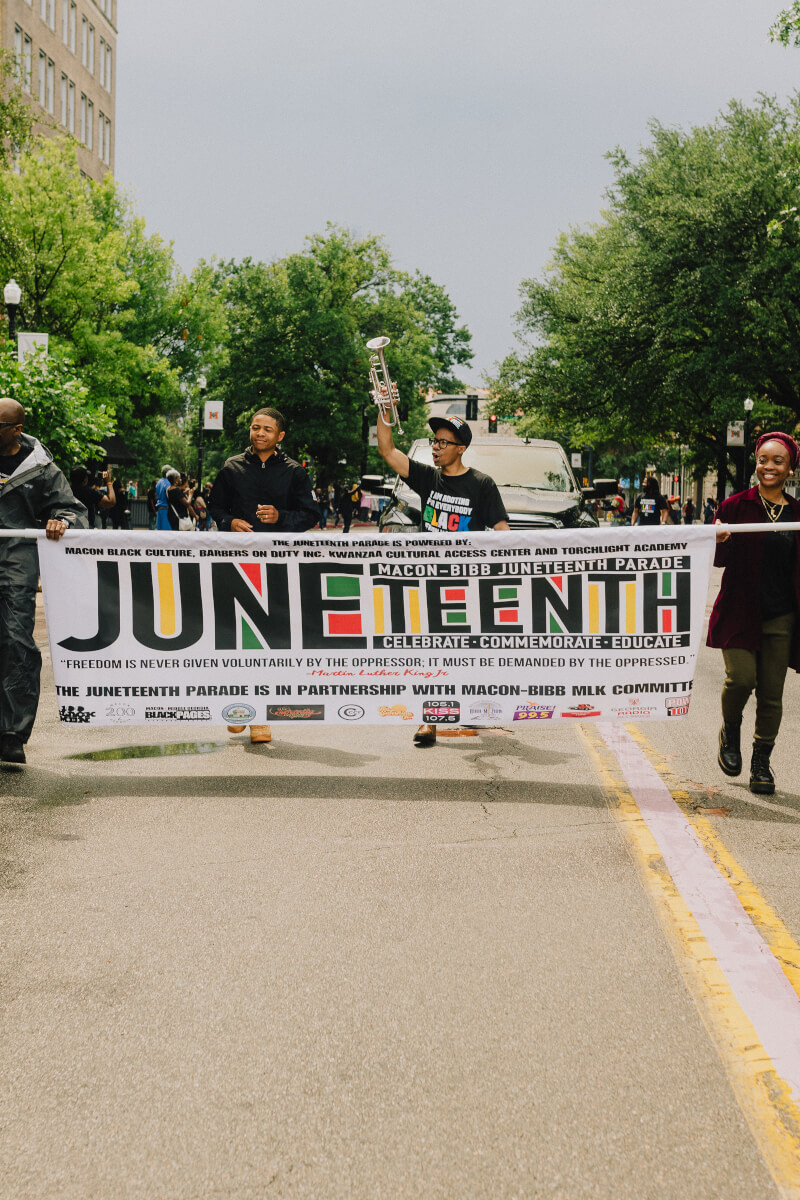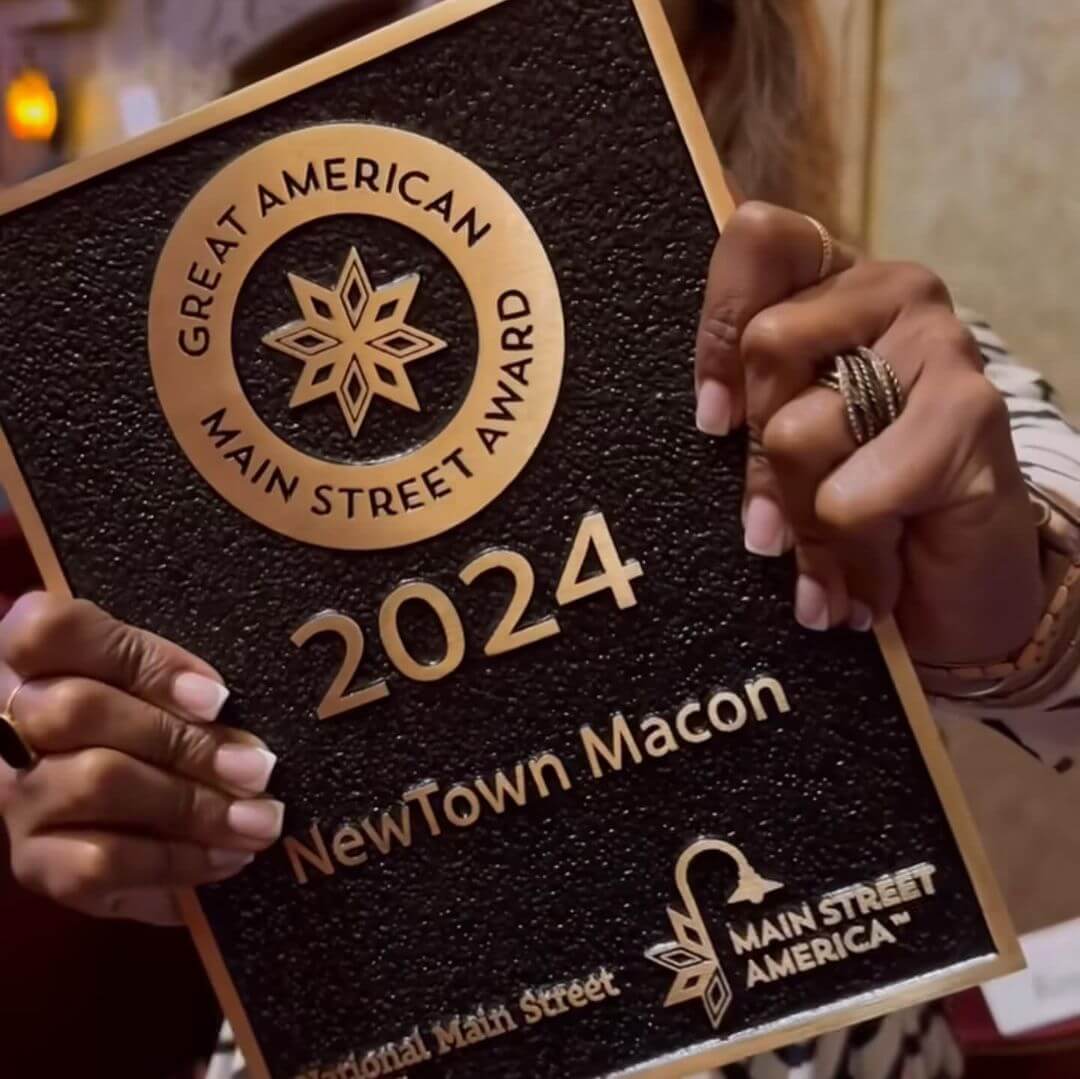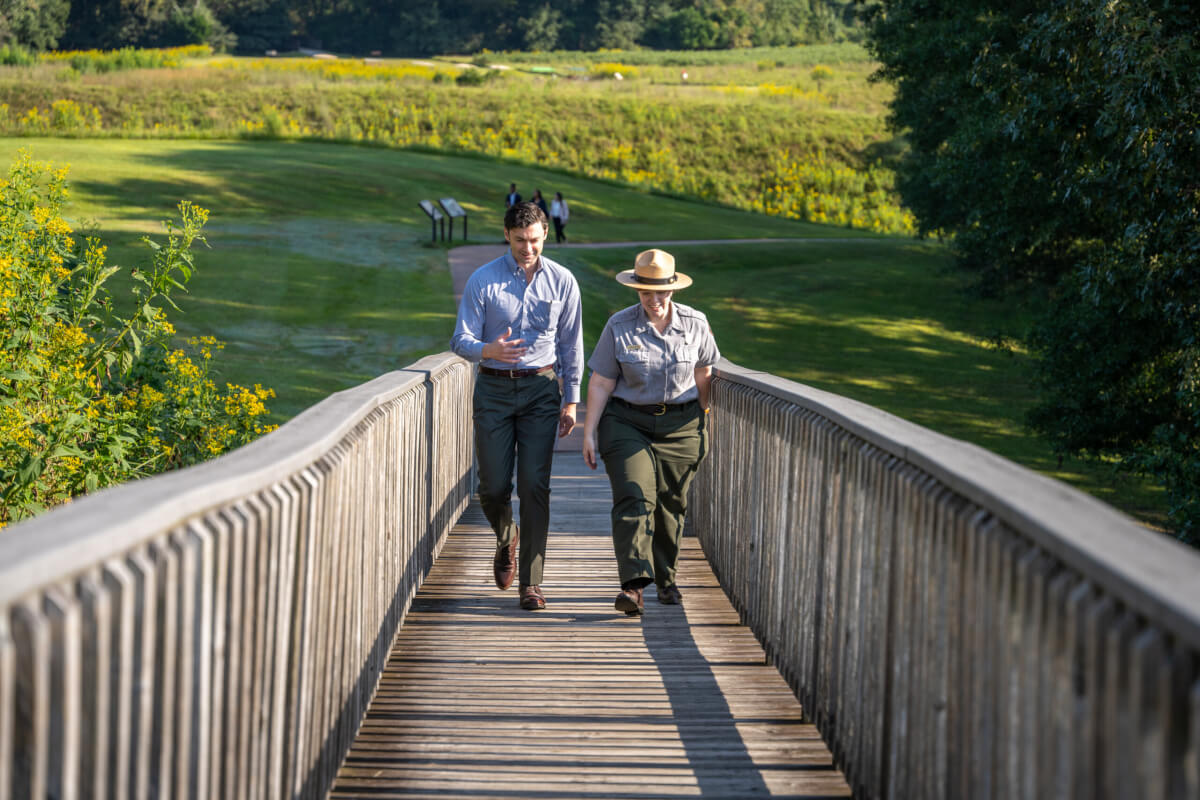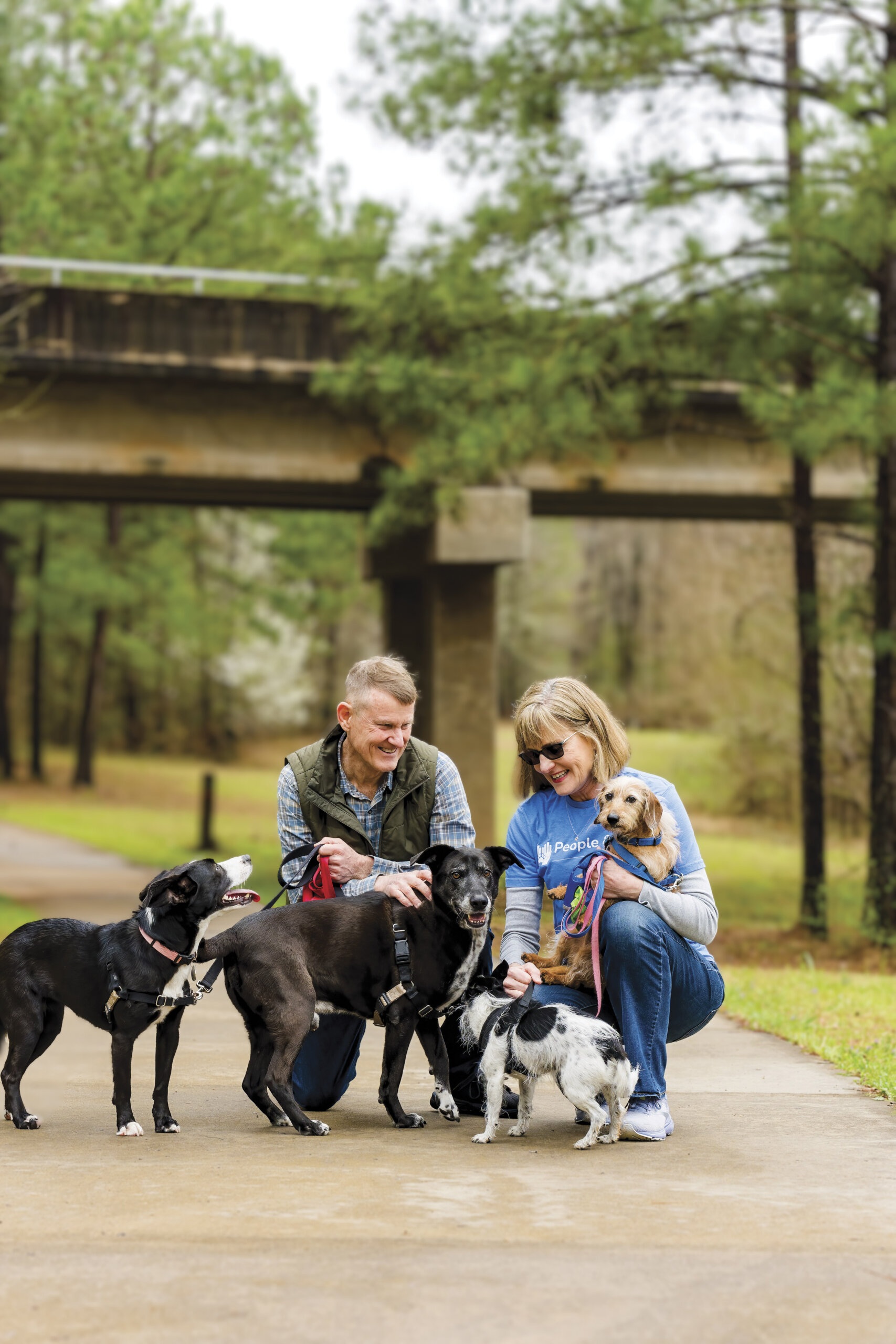
Breaking barriers and breaking news
Central Georgia’s Hispanic media changemakers, Moises Velez and Monica Pirela
Story by Edna Adams and Sierra Stark Stevens
Photos by Yadira Sandoval Rodríguez
These days, it’s easy to get your daily news with the click of a button or swipe of a screen. Especially in Central Georgia, our local news is on top of stories you need to know to get through your day. About 35 years ago, it wasn’t as easy for our Spanish-speaking community to know what was happening in our city.
The Spanish-speaking community is no small demographic. In 1985, about 17 million Americans were Hispanic. As of the 2020 census, Latinos accounted for 18.9% of the U.S. population, making them the second-largest racial group in the country, 62 million strong – and the fastest growing. More than 20,000 Hispanic Central Georgians live in the 11-county region, according to the latest Census Bureau estimates. That’s one in every 25 people in our community.
The absence of Hispanic news coverage changed in the late 1980s when Moises Velez, who had recently moved to Macon, noticed a need he could fill. By founding Que Pasa, Velez became a go-to resource for Spanish news and a trusted advocate for Hispanic Central Georgians, bringing their voices to important conversations. He expanded his reach with a radio show and later a newscast on Mercer’s WMUB television station.
In 2014, Monica Pirela came on the scene with Medientiorno Magazine, expanding bilingual journalism in the region and covering additional ground from her location in Warner Robins. Noticing a paradigm shift to digital media, she transformed her business model by founding NotiVisión and becoming director and coordinator of Spanish radio news for Estrella Digital in Atlanta, Oasis 97.3 FM in Augusta, and El Gallo 94.3 FM in Middle Georgia, seeking to fulfill what she sees as her “ethical and moral responsibility” to “listen … carefully to silenced voices, ignored concerns, and dismissed dreams, and then translat[e] those voices into stories that can touch the heart of society.”
In Que Pasa’s 25th year, Senator Jon Ossoff commended Velez to President Biden for his life’s work. Both Velez and Pirela have been named among Georgia’s 50 Most Influential Latinos by the Georgia Hispanic Chamber of Commerce. In addition to their daily media work, they are active in their communities, organizing events, fundraisers, and networking opportunities for their constituents. As powerhouse journalists who fight tirelessly for Central Georgians, they break barriers for Hispanic representation and crucial news to those whose needs were not being met by English-language outlets, creating a better-informed and more equitable Georgia. Read on to learn more.
Moises Velez
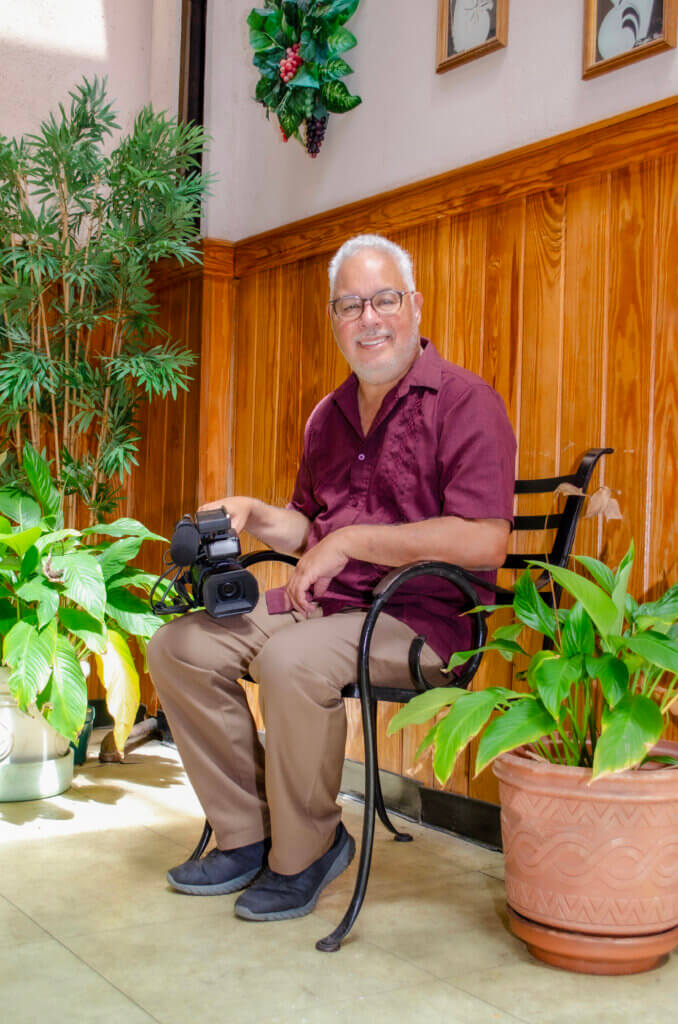
Velez at the Que Pasa offices.
From the island of Puerto Rico to the heart of Georgia
Velez is from Santurce, Puerto Rico, where he gained experience in videography and television. While living there, a group from the United Methodist Church in Macon traveled to Puerto Rico to learn about ministry on the island. Velez couldn’t help but suggest a camera angle to a man with the church who was recording the visit. That man later offered Velez a job with the church to work in video production. That decision brought Velez and his family to Macon, Georgia, in 1985.
“I’ll never forget my first time in Macon,” said Velez. “It was during the Cherry Blossom Festival, and we were downtown as the hot air balloons were all around us. I just fell in love with Macon right there and knew I would call this place home.”
Velez made it home. He devoted seven years to the United Methodist Church as the production manager until he started his own company, GNM Media Productions. He kept this company while working different jobs at companies such as Wendy’s, YKK, and Geico.
En Casa and The Telegraph
In 1987, he helped create an organization called En Casa, which translates to at home. This nonprofit provided entertainment and networking. For two years, they helped bridge the Hispanic community and Macon at large, offering English and Spanish classes, food banks, cooking classes, and more. Velez first created a newsletter in Spanish to inform the Hispanic community about the opportunities and events happening throughout Macon. This evolved into creating a Spanish section of articles in The Telegraph. While this wasn’t a paid opportunity, a friend encouraged him, saying, “What you’re going to learn through this is more important than any money you’re going to collect right now.”
Que Pasa with diversity
Shortly after the Telegraph decided to no longer run the Spanish section, the opportunity paid off. Equipped with more experience, in 1988 he created his first newspaper publication, ¿Qué Pasa En Casa?, now known throughout our community as Que Pasa.
“It wasn’t easy, especially because I’m from Puerto Rico. At that time, most of the Hispanic community was composed of Mexicans. Our cultures are a little different, and I don’t think they were as open with me,” said Velez.
But he kept trying, spending his nights and weekends making it out to as many events in the Hispanic community as possible, such as Quinceañeras, dances, and parties.
“I learned how to drink atole [a Mexican hot corn and masa drink] and eat spicy foods, which I didn’t really like at the time,” said Velez. “I also went to every event and took pictures to get them to look out for the next paper. It worked.”
It wasn’t long before Velez gained the trust of many in the Hispanic community, and his newspaper gained loyal supporters. He wrote articles catered to his audience, such as how to open a checking account, what to know when setting up a doctor’s appointment, and everyday tasks that may seem easy to some but difficult to people who didn’t speak English and were arriving from a different country.
He said one of his biggest initial challenges with connecting with others in Macon was his accent. He grew up bilingual, like many from his island. Still, his English had a Puerto Rican flavor. “When I came to Georgia many years ago,” he said, “I had trouble understanding the English here.” Southern English and African American English do not “always sound the same as my English or the English you hear on the news,” he said. “You have to get used to my accent as I get used to your accent.”
As a Puerto Rican, Velez was an American citizen from birth, and he and his family were especially welcomed by their church family at United Methodist Church, supporting their transition to life in The States. He didn’t face all the same challenges other new arrivals to Central Georgia faced, but what he found through his work with En Casa and Que Pasa was that immigration information was a top priority for readers, and much of his newspaper’s content was designed to help his community navigate the process of becoming U.S. citizens. “When I do the news, … it’s what people tell me [they need]. They tell me, ‘This is what’s happening,’ and that’s how I address the issues.”
Not everyone who immigrates from Latin America speaks Spanish as a first language, such as some Guatemalans who speak indigenous languages or dialects like Mam, or Brazilians who speak Portuguese. Part of Velez’s continued work in immigration justice is to connect those who do not speak Spanish or English as their first language to appropriate language courses, like those at Family Advancement Ministries on Orange Street in Macon.
Nowadays, U.S. and Georgia Latinos are more diverse than ever, with a 25% increase in immigration from Central America – countries including El Salvador, Guatemala, and Honduras – and a net negative immigration from Mexico – from 2013 to 2018, more people immigrated from the U.S. to Mexico than vice versa, according to PEW Research Center data. Velez sees this as being all the more reason for Latinos to find common ground, championing the diversity of their cultures while celebrating what they share and advocating for their shared needs.
Hispanic buying power
Another important aspect of Velez’s work has been building a strong network for Latinx business owners, connecting them to the right community contacts, and getting the word out to potential customers. From the beginning, he sought to prioritize Latinx-owned businesses in Que Pasa. He believes in Hispanic buying power and entrepreneurship.
According to the University of Georgia’s Selig Center for Economic Growth, the U.S. Hispanic market’s spending power grew to $1.9 trillion in 2020, an increase of 87% from 2010. That buying power is larger than the GDP of Italy and almost as large as the GDP of France. Data from L’ATTITUDE Ventures, a multi-millions-wielding access-mission venture capital firm that invests in Latinx businesses, indicates U.S. Latinx-owned businesses accounted for nearly 80% of all net new businesses created during the last decade, representing a 47% increase, including two million by Latina women.
To Velez, creating strong Hispanic business connections made – and makes – good financial sense, and he encourages others to follow his lead. “When you discriminate against someone, you are losing money. Hispanics are entrepreneurial, and we come to this country to work.”
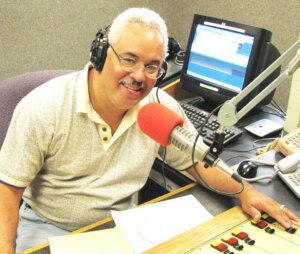
Velez hosts his Viva radio show. Archival photo submitted by Moises Velez.
Don Moises on the radio
“What really got me connected to everyone was my radio show,” said Velez. “People got to know me better by welcoming me into their homes and bringing me along for the ride during their commutes.”
Viva, a radio station in Atlanta, decided to expand to Macon, and Velez had his own show. They played music, and he talked about what was happening in the community. It lasted about four years before going off the air, but Velez says that really helped him reach more people’s trust.
“I would get calls and messages saying, ‘I’m listening to you while I’m making my husband tortillas, Don Moises!’” recalled Velez, laughing.
Trusted voice of the community
While there were many fun times and stories, Velez told stories that mattered to his community – stories that were otherwise not covered by stations and newspapers. One he remembers with great detail was when two Hispanic brothers went missing, and Velez felt it wasn’t publicized by any local media. The Hispanic community was upset and felt like they were overlooked. Velez states that he was the only local journalist who covered the incident. It was later discovered the brothers drowned in the river while running, as they were undocumented, according to Velez.
“One thing to remember is that not all undocumented people are criminals or bad people. They are scared. They’re human,” said Velez. “I was able to be a voice for my community during that time, and I think I gained their trust even more.”
Velez noted that the quantity of Que Pasa’s immigration coverage changes with the prevailing attitudes of the season. During a recent administration, when walls were going up across borders, he said, his community became disheartened. Immigrants “were called criminals, and we need to change that. They need to see themselves – we need to see ourselves – as productive instead of second-class citizens. We contribute.”
Moises at Mercer
Another way Velez has built trust is by partnering with Mercer University. Dr. Jose Pino, Chair of Foreign Languages and Literatures Department at Mercer, has worked with Velez to secure student internships at Que Pasa, where students learn real-world journalism and Spanish language skills, and as a community partner in the Hispanic Health Fair, with which Monica Pirela also assists. Pino stated, “Anytime I need something, Moises is always there, helping me. And I am also helping him.”
As a part of their work in connecting Hispanic residents with vital healthcare information, Pino and his students conduct surveys to gather data about the health needs of the Hispanic community (see maconmagazine.com for the results of their studies). Over the last seven years of health fairs, they have found that access to health insurance is a top need, and lack of ability to communicate complex health needs with English-speaking healthcare providers is another.
Through Que Pasa Multiservices, Velez and his team offer medical interpretation. Velez stated that he also helps on a volunteer basis to resolve insurance miscommunications. Looking toward the future, Pino envisions a free health clinic, an idea Velez supports.
Marquiez Cornelius, Studio Manager at Mercer University’s WMUB television network, has worked with Velez on Que Pasa newscast, which has aired on their channel on Friday, Saturday, and Sunday for the past eight years. Cornelius says he enjoys working with Velez because of his passion and thoughtful influence. “Moises’ show [provides] … that diversified look into what’s going on in that community … Sometimes, as journalists, we get busy covering what is closest to our own heart – and the information we have access to also determines what we can cover. When you don’t speak Spanish, you can’t always know what is happening in that community. So, a bilingual show on this network is definitely something I had to include; that way, we are really representing everyone in our community,” said Cornelius.
Velez says the broadcast being bilingual is especially helpful for households where children and parents might have different levels of fluency in Spanish, allowing children who may have more English to connect with their parents, who may primarily speak Spanish, over the local news together.
Pino sees Velez as a pioneer for Hispanic Central Georgians. “At the beginning, there was only one newspaper. Nowadays, I am glad we have more. We have more awareness because the Hispanic community is growing and having more impact.” Referencing Velez’ and Pirela’s nomination to the 50 Most Influential Latinos in Georgia, Pino stated, “Their work is great for the community and for us. I hope people will see that and invest more in our Hispanic community.”
Recognizing what’s important
Velez was humbled when he received word that he’d been peer-nominated and awarded as one of the 50 Most Influential Latinos in Georgia. And, while, as a U.S. citizen of Puerto Rico, he was never given the right to vote for senators or the president until he became a Georgia resident, he was thrilled to know his decades-long work in advocacy and journalism was of importance to U.S. leadership, evidenced by his presidential commendation. He said, “The recognition really belongs to the people who have been backing me up all these years, and it’s not so much a recognition to my person, but to my work in the community. That’s why I’m doing it. Because if I touch one life, and that person gets enough from what I do to be able to change and have a better way to live, that is what is important to me.”
Senator Jon Ossoff told President Biden, “Mr. President, as Georgia’s U.S. Senator, I commend and recognize Moises Velez for his contributions to Georgia’s Latinx community and years of service to the Macon community … Mr. Velez’s vision of keeping newly arrived immigrants informed about vital services available to them in Middle Georgia and across the State quickly transformed the newspaper into a trusted news source for the Latinx community on important issues like health care, immigration, and education.”
But Velez is far from finished making waves. He is glad to have a seat at the table, he said, but “don’t invite us to the table if you are not going to listen to us. If you want to fulfill [the idea of] having a minority voice, you have to listen when they speak.”
Velez conveyed gratitude to our current city leadership, stating that he is on many committees, including the Bicentennial Committee. “And that is a good thing to do,” he enthused.
Still, he envisions an even brighter future where there is Hispanic representation in every room where decisions are made that affect the community, and that Hispanic youth will continue to enter leadership positions in greater numbers in every field. As the fastest-growing and youngest demographic in the U.S., it’s projected that by 2050, one of every three working-age Americans will be of Latinx heritage. “They will be the people taking care of us, of our children, of our parents,” Velez said, saying it’s never been more important to ensure that all American youth, including Hispanic youth, have access to the best opportunities to make our country stronger.
Velez concluded, “I think the problem has been that we had two communities running beside each other but not intersecting each other. And that’s what we need to do – to get together. There is nothing we cannot do if we do it together instead of divided.”
Monica Pirela
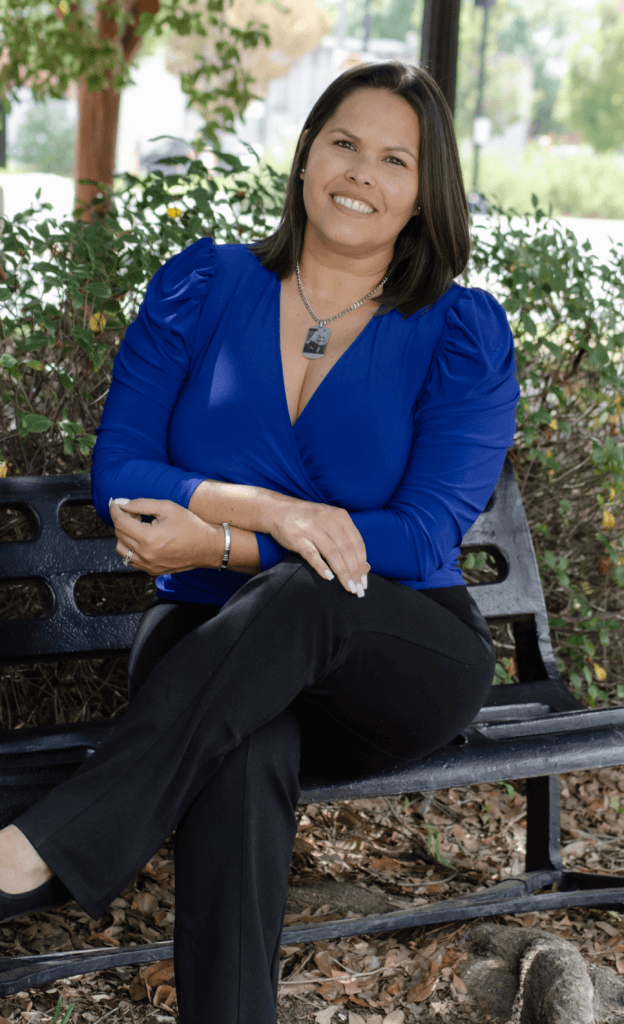
Pirela in Rosa Parks Square in Downtown Macon.
Fleeing Venezuela
Being a voice for the voiceless is why Monica Pirela wanted to become a journalist. Born and raised in Maracay, Venezuela, she studied broadcast journalism at the University of Venezuela. She produced her first magazine, Medientorno Magazine, in Venezuela, specializing in health.
Pirela moved to Byron, Georgia, in 2014 after escaping the political corruption happening in Venezuela. The minute it felt unsafe for Pirela and her family, they had no option but to leave and come to the United States. “We were personally working for the political opposition at the time, and we would protest against the government,” said Pirela. “It got so bad that people broke into our home, ruined our belongings, and threatened us. That was when we decided we needed to leave.”
She continued, “When I had to leave Venezuela, I knew I was leaving behind a very important part of me – my family and my roots. I didn’t leave because I wanted to; I had to do it, and that transformed my entire essence as a person. It was my own country, my Venezuela, that showed me the value of being a voice of those who cannot speak. Everything we began to be ‘free’ began to fade, to be silenced, and that’s when I realized the value of having a voice, of being heard, of being attended to, of belonging to a community. … It’s about listening carefully to silenced voices, ignored concerns, and dismissed dreams, and then translating those voices into stories that can touch the heart of society. … It’s an act of solidarity and compassion in its purest form. But it’s also an ethical and moral responsibility.”
Medientorno Magazine makes bilingual connections
Once she knew her family was safe, Pirela continued her journalism work and created a bilingual version of the magazine she created in Venezuela but catered to Central Georgia readers and events.
“I saw there was a need where we could inform our Spanish-speaking community, but also inform the English-speaking community about the things happening in the Hispanic community,” said Pirela.
Medientorno Middle Georgia was a print publication for about four years until Pirela realized they needed to go digital if they were going to reach more people.
According to PEW Research Center data, 94% of U.S. Latinos use mobile devices to access the internet, and on a typical weekday, 75% get their news from internet sources. Pirela stated that in her experience, this “has significantly changed how news is reported and consumed. This trend has necessitated adaptation in the field of journalism. As a media outlet, we’ve had to undergo training in social media management and adjust our content strategies to offer news in different, more natural and fresh formats, all while maintaining the quality of information. … [T]he speed of online news has presented challenges, but … we have been adapting to the new trends of the digital era without losing sign of the essence of well-executed and responsible journalism.”
Founding NotiVisión Georgia
In 2018, NotiVisión Georgia was created to be not only a communication outlet but also a social component where they could physically be engaged with the community.
“I quickly realized that getting trust from the Spanish-speaking community was not going to be easy. Our people are the type where they need to see to believe,” said Pirela. “We try to be as transparent as possible.”
NotiVisión’s easily navigable website, digital archives, and social media savvy set it apart from the more traditional print, local broadcast, YouTube, and Facebook presence of Que Pasa. Pirela praises Velez’s foundational work. She simultaneously believes that “over the past nine years, we have set ourselves apart by focusing on innovation, expanding our reach, and creating journalism that not only informs but also empowers and connects more deeply with the community” who benefit from NotiVisión’s next-generation approach.
Expanding the footprint
Headquartered in Warner Robins and offering a different perspective, NotiVisión expands the footprint of Hispanic leadership and advocacy in the region. Pirela has worked hard for NotiVisión to be a point of reference for the Hispanic community regarding finances, government, health care, education, and other topics. She and her team are working to bridge the gap between the Hispanic community and the rest of Central Georgia – and beyond, to state and national platforms.
As a part of this mission, in 2022, Pirela became president of HispanoLead, “a nonprofit organization whose main objective is to help (in different areas) the Hispanic community in the region.” Going further geographically, Pirela contributes to statewide Hispanic news as director and coordinator of Spanish radio news for Estrella Digital in Atlanta, Oasis 97.3FM in Augusta, and El Gallo 94.3FM for Middle Georgia.
Regarding her commitment to expanding the platform for Hispanic voices to reach further, she stated, “We all deserve to have a say in decisions that affect us and in the building of a more equal and diverse future. Journalism is a powerful tool to achieve this, and my commitment is to continue working toward that goal.”
Empowering others

At the 2023 Hispanic Heritage Festival in Downtown Macon. Left to right: Bibb County School District Superintendent Dan Sims, Ana Hernandez, Monica Pirela, Mayor Lester Miller, Edna Adams
She remains active close to home. During the pandemic, Pirela stated, NotiVisión “did a good journalistic job” by connecting with reliable sources to provide trustworthy, objective, and truthful information in Spanish to a community full of questions and fears about the global situation. This work of providing quality and responsible information made the community turn to us, trust our work, and let us know their needs, fears, and concerns. It was then that we discovered another need: the community needs to be attended to and heard. That’s what we did.
We began to reach out to people who have supported us since our beginnings, such as organizations and small business owners, to bring resources to our community: COVID-19 vaccines and testing events, food distribution, voter registration campaigns, Census 2020 campaigns, among others. Many of these events were conducted with bilingual teams (to make the Hispanic community feel more comfortable and attended to). I believe that the community no longer feels alone or neglected; they now know that they have a team that can support and represent them in various areas.”
As a board member of De Mujer a Mujer, a nonprofit group open to any woman of Hispanic heritage, Pirela helps to serve “serves young ladies and women from age 12 and beyond in areas such as, but not limited to, holistic mental health, financial stability, and spiritual growth with the intention of developing a better, more rounded individual.” Through conferences, workshops, scholarships, support groups, and education-focused fellowship, De Mujer a Mujer empowers and encourages Central Georgia Latinas.
Pirela says this mission extends into her work at NotiVisión. “NotiVisión Georgia also aims to empower members of our community, especially Hispanic women entrepreneurs. We have organized workshops and informative talks in both the business and personal spheres. We want people to educate themselves, learn, develop their skills, and grow.”
Like Velez, Pirela believes that fostering connections among people of all backgrounds is the way to a better future. Pirela stated, “My commitment is to serve the community at large, regardless of their origins or nationalities. I firmly believe that the language of respect, trust, effective communication, excellence in service, and hard work are universal values that unite us as human beings. Through these values, I have had the opportunity to build meaningful and collaborative relationships with people from various parts of the world, demonstrating that trust and mutual understanding can overcome any cultural or geographical barrier. I am committed to continuing to work on promoting these values to build a more inclusive and supportive world.”
Pirela and Velez: connecting the community in 2023
Pirela and Velez may have what the media would call “competing outlets,” but together, they are making a huge difference in Central Georgia. More than just breaking news, their online videos, publications, appearances at local events, and untold story coverage bring a sense of belonging to their communities, breaking down barriers that disconnect Spanish- and English-speaking locals.
For Hispanic Heritage Month, which runs from September 15 through October 15 every year, both Velez and Pirela helped lead events to celebrate the cultures in our community.
Velez organized his annual Hispanic Heritage Celebration at Smiley’s Flea Market (6717 Hawkinsville Rd, Macon) on Sunday, October 1, 2023 from 10:00 a.m. until 4:30 p.m. It featured live music from different bands, traditional dances, food, contests, and so much more.
Pirela was an organizer of the Macon-Bibb Hispanic Festival, which took place Saturday, October 7, 2023 from 1:00 p.m. until 7:00 p.m. at Rosa Parks Square (701 Poplar Street, Macon). This was the second year the event featured live music, dancing, food, vendors, and entertainment for kids.
These Hispanic leaders are working to celebrate and connect cultures in our community. The journeys to their goals may look different but have the same end goal – to reach more people and bring them fully into the heart of Georgia.




